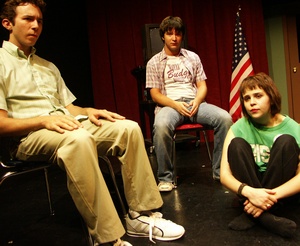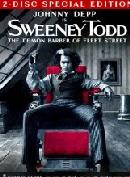HOME PAGE
SITE GUIDE
SEARCH
ADVERTISING AT CURTAINUP
REVIEWS
FEATURES
NEWS
Etcetera and
Short Term Listings
LISTINGS
Broadway
Off-Broadway
NYC Restaurants
BOOKS and CDs
OTHER PLACES
Berkshires
London
California
New Jersey
Philadelphia
Elsewhere
QUOTES
TKTS
PLAYWRIGHTS' ALBUMS
LETTERS TO EDITOR
FILM
LINKS
MISCELLANEOUS
Free Updates
Masthead
Writing for Us
A CurtainUp Los Angeles Review
Speech and Debate
By Ariana Mufson
|
People in Salem are pretty open-minded. —Solomon People in Salem are straight. I don't know, I'm new here, I grew up in Portland, but. . .people here think they're liberal, but most are like liberal Puritans. . .— Howie |

Aaron Himelstein, Michael Welch and Mae Whitman in The Blank
Theatre Company Production of Speech and Debate.
|
The play centers on three teenagers—Diwata (Mae Whitman), Solomon (Aaron Himelstein), and Howie (Michael Welch)— coming of age in Salem, Oregon. Howie describes the town's constituents as "liberal Puritans". Everyone has a secret — and it is this hypocrisy that serves as a theme throughout.
The three kids converse frankly about the taboo topics that their teachers and parents have indicated as off limits. While Diwata blogs about inappropriate teacher/student relations, Solomon tries (unsuccessfully) to convince the school paper to let him tackle the mayor's sex scandals with children. Howie, meanwhile, wants to start a gay/straight alliance, which is difficult to do without a faculty advisor who will agree to sponsor the club. Eventually, an unlikely friendship triangle forms, and together they bring to light some startling truths about what is really going on in Salem. As Diwata repeats several times, "Are we in Salem, Oregon or Salem, Massachusetts circa sixteen-twenty-whenever-those-witches-were-bein-hunted?"
After she fails to win the lead in the school musical, Diwata's main objective is to form a speech and debate club. But despite its title, the play has less to do with speech and debate than with free speech. The play evolves through short scenes preceded by clever headings denoting the form of debate to which the scene relates. Although this parallel could be pushed further to add more resonance, as a whole the club's rehearsals are hilarious. An unexpected dance sequence in particular is a highlight.
Despite the heavy topics, Karam and director Daniel Henning manage to keep the humor spot on. The staging and production design are top notch, transforming the Blank's small space into multiple levels. The play is at its best when the scenes are short and sharp, but there is a definite lag after the first hour when the plot stops moving forward. Fortunately, everything picks up toward the end and the play has a strong finish.
The performances are uniformly strong (all three actors have extensive television and film resumes), but the standout is Michael Welch as Howie (an openly gay student). His expressions and tone are pitch perfect and underplayed. As a result, his character comes off as genuine and engaging rather than stereotypical. Mae Whitman is a powerful presence as Diwata, especially when she blogs online through her video cam with musical musings. Occasionally, her energy becomes frenetic and over-the-top, playing for laughs instead of letting the humor emerge organically, but she excels during the more serious moments, when her vulnerability and acting chops shine through. Aaron Himelstein rounds out the cast as Solomon, and some of the best scenes are between him and Welch, with overlapping dialogue and an easy rapport that makes them fun to watch.
Even as the characters come to the realization that change does not come easily to small towns, the resounding message is somewhat optimistic. It's a relief to see teenagers speak like teenagers, confronting uncomfortable and taboo situations with candor and wit. Through its biting dialogue and dark humor Speech and Debate becomes a pertinent and unique take on the high school experience—and a Blank Theatre Company must see.
|
Speech and Debate Directed By: Daniel Henning Written By: Stephen Karam Cast: Dale Dickey, Aaron Himelstein, Michael Welch, and Mae Whitman Production Design: Ian P. Garrett Costume Design: Bich Vu Sound Design: Warren Davis Music Director: Evelyn Halus Graphic Design: Rick Baumgartner Running Time: 1 hour 45 minutes, no intermission Dates: Now through October 26, 2008. Thurs/Fri/Sat at 8pm; Sun at 2 pm The Blank's 2nd Stage Theatre, 6500 Santa Monica Blvd. 323-661-9827 www.TheBlank.com Tickets: $22 (Thurs. & Sun.), $28 (Fri. & Sat.) Reviewed by Ariana Mufson on 9/21/08. |
|







